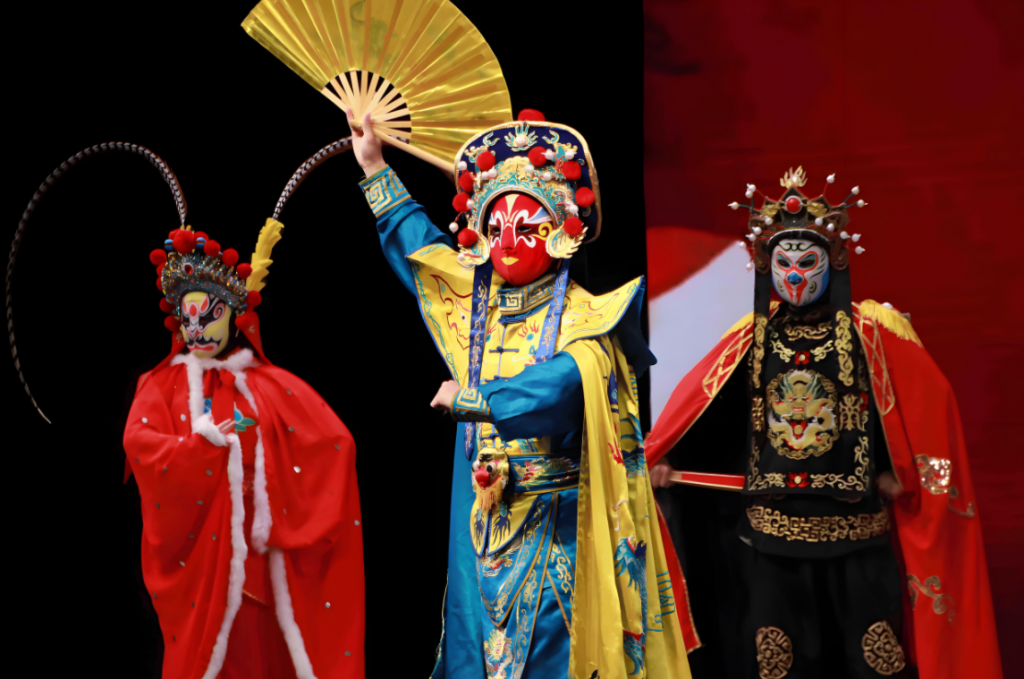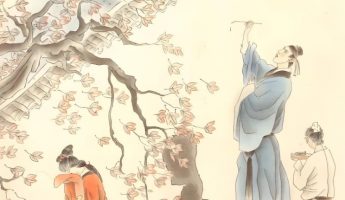If words are insufficient, then sing. We convey emotions through singing, becoming poetry, music, and drama in the continuous and stirring process. The sound echoed in the vast world, falling on the clear willows and waves of Jiangnan, and was transformed into a gentle and tender Kunqu opera by the bright eyes of talented people and scholars; Falling in the northwest of the plateau where the wind is crisscrossing, it is roared into a fiery Qin Opera by the unyielding old Qin; The magnificent scenery of Sichuan and Chongqing, which falls on the peaks and ridges, has been transformed into a versatile Sichuan opera by the tolerant and enterprising spirit of the brave warriors who destroy the mountains. Beijing Opera, Yue Opera, Huangmei Opera, Tibetan Opera… The city once erased “differences”, but the sound awakened “differences”. In the scattered notes and tones, there is a dialogue between a local resident and a local scenery. The scenery nurtures people, and people sing and listen to the scenery in the millennium inheritance. That belongs to the voice of China.

Kunqu Opera
What kind of beautiful scenery is there on a good day? Who is there to enjoy?
The light water sleeves on stage sing ancient and elegant love songs like flowing water. The tone of Kunqu Opera is soft and delicate, slowly infused and meticulous, hence it is known as the “Shuimo Tune”. The gentle breeze blowing from the depths of the Jiangnan courtyard transformed into Tang Xianzu’s words. Every person who is new to Kunqu opera will exclaim at the charm of spring scenery, just like Du Liniang did when she visited the garden. How can we know the beauty of it without experiencing it firsthand? Although beauty is everywhere, it all originates from Jiangnan. Kunqu originated in Suzhou and gradually spread throughout the Jiangnan region. In that water town, winding stone bridges and peaceful alleys, permeated with the water vapor and fragrance of books in the city, imbue the culture nurtured here with tranquility and connotation. Waking up to the sound of oars, falling asleep with the night rain pounding on lotus flowers. Having tasted osmanthus wine and snow crab bucket, it seems that only people from Jiangnan can understand this emotion. After four hundred years, this ancient story is still passed down and sung on this land, because they know best that they must not let go of this beautiful and fleeting time.

Shaanxi opera
Eight hundred miles of Qinchuan raise dust, and 30 million Shaanxi people sing Qin Opera in unison. Qin Opera Opera does not belong to Shaanxi alone. It has been heard all over the northwest. The Guanzhong dialect exudes a passionate and strong charm, with the striking sound of bangs and the rhythm of gongs and drums intertwined. The high pitched singing style is like flowing clouds and water, in sharp contrast to the softness of Kunqu opera, like two worlds in heaven and earth. Only roar can reflect the boldness of Qin Opera and match the internal pride of people who inherit the charm of Qin and Han Dynasties. The central axis Terra Cotta Warriors in Xi’an, Shaanxi Province. The stage of Qin Opera Opera is in the vast northwest, where there are loess, mountains and plains. The actors’ bodies are flowing with the wind of the plateau, the boulders of the mountains and the waves of the rivers.
As soon as I step into the land of Sanqin, I feel like I have seen through thousands of years. Taste a bowl of spiced oil and drink a mouthful of Xifeng wine. People in the northwest combine the pungency and the aroma of wine into their pride, and send out a loud Qin Opera, which shocks the land for 800 miles. They firmly believe that no matter how difficult the world is, they can be as heroic as Qin Opera Opera and burst out endless vitality.

Sichuan Opera
Face changing in Sichuan Opera is like spitting fire in Qin Opera, which is its signature skill and unique skill. Whenever these skills are showcased, the audience is always packed with people, with no empty seats. With the constantly changing facial expressions on their cheeks, the actors express their inner emotions one by one. This way of concretizing inner feelings vividly reflects the joys and sorrows of the play in the melodious singing, while also showcasing the unique poetry and romance of the Sichuan Chongqing region. With the large-scale migration of the “Two Lakes Filling Sichuan” in the Qing Dynasty, various opera voices continued to emerge, and the formation of Sichuan opera was the fusion of numerous styles. This inclusive trait perfectly matches this land and its people. From a macro perspective, the mountains and waters of Shu are magnificent, with fog enveloping Chongqing. The Sichuan Chongqing region is located on the southeastern edge of the Qinghai Tibet Plateau, nestled in the purple soil of the Sichuan Basin and extending to the undulating mountains and rivers in the eastern part of Chongqing. From a microscopic perspective, the tripe, yellow throat, and duck intestines in hotpot, as well as the unforgettable consumption of fish, all blend together in a steaming hot broth.

Tibetan drama
Do you remember the sound of your hometown?
It is the sacredness of Tibetan opera, drifting in the snow covered lake of the Qinghai Tibet Plateau, accompanied by the chanting and prayers of devout believers, scattered in the wind between the snow capped mountains and grasslands; Still with the ups and downs of Beijing Opera, it portrays the tragic scene of Yu Ji committing suicide and the myriad emotions of a drunken noble consort; Or it could be the enchanting Yue opera, the mysterious and magnificent Nuo opera, or the affectionate Huangmei opera
These ancient sounds, carrying the nourishment of nature and residents, awaken the flattened ‘differences’ in the city. Through generations of singing, they have profoundly influenced the local culture and character. In fact, these voices have already taken root in everyone’s blood. If you bend down and listen, you will definitely feel the constantly surging and unique Chinese voice.



